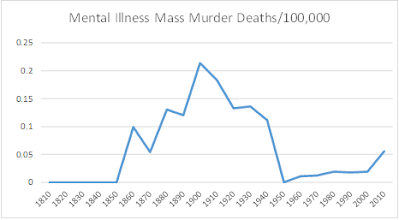I have long wondered if the dramatic increase in mass murder deaths/100,000 people in the period 1860-1909 might have something to do with Civil War PTSD.
Another interesting quirk is the rise in mental illness mass
murder incidents and deaths in the 1860s and 1870s continuing upward until the
decade starting in 1900. One hypothesis
worth exploring is whether this might represent PTSD among returning Civil War
soldiers. It was not recognized until
recently,[1]
but the enormous percentage of Americans who fought in the Civil War might
explain the several decades of increase.
Recent estimates suggest that 750,000 soldiers died in the Civil War,[2]
more than any other war in our history, and a much larger percentage of the
population fought in it: 20%.[3]
[1]
“Post Traukmatic Stress Disorder and the American Civil War,” National Museum
of Civil War Medicine, May 2, 2019, https://www.civilwarmed.org/ptsd/,
last accessed January 14, 2023.
[2]
[3]
The Civil War Soldiers and Sailors System contains records on 6.3 million
service members. “The Civil War,”
National Park Service, https://www.nps.gov/civilwar/soldiers-and-sailors-overview.htm,
last accessed January 14, 2023. U.S.
Census Bureau, https://www.census.gov/history/www/through_the_decades/fast_facts/1860_fast_facts.html,
last accessed January 14, 2023.

I was wondering recently how many "Strict" or borderline violent fathers I knew of and heard about when I was growing up was due to PTSD from WW 2. Smoking cigarettes calmed people down, and the Army passed them out like Halloween candy (one coworker who served in Vietnam said that you almost couldn't afford NOT to smoke. Smoking statistics showed that in the nineteen fifties upwards of 50% of men smoked, and it declined steadily in the decades since.
ReplyDeleteCigarette companies contributed to the war effort by giving the government cigarettes for rations. How noble of them!
DeleteI've seen it speculated in other literature that the exposure to war time violence made men more accustomed and prone to violence through desensitization. I think you have the better explanation for the severity of the spike; emotionally broken and traumatized men being much more susceptible to breaking with poorer understanding of mental health.
ReplyDelete